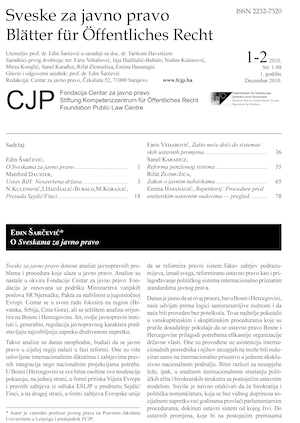

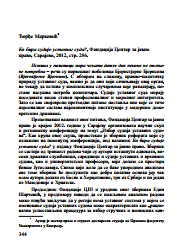
Keywords: book review; judiciary; judges; election; Constitutional court;
Review of: Đorđe Marković "Who Elects the Constitutional Court Judges ?", Center for Public Law Foundation, Sarajevo, 2012, p. 286.
More...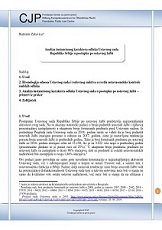
Keywords: Constitutional Court; Serbia; court decisions; constitutional appeal; protection of human rights; public law;
Constitutional appeal has become an effective tool for protection of human and minority rights and freedoms by the Constitution of Republic Serbia in 2006. Since than, he Constitutional court has the opportunity to review the individual legal acts in the constitutional appeal procedure. However, from the outset, the question arose as to whether this power of the Constitutional Court also implied the possibility of reviewing court decisions; does it include the right of the Constitutional court to annul court decisions if it found that they had been violated a constitutionally protected right. In its jurisprudence, the Constitutional court overturned court decisions in such situations, which led to controversy and latent conflict in the relationship of this court to the ordinary judiciary, esspecialy to the Supreme Court. Since 2013, the Constitutional court's ability to overturn court decisions in proceedings on constitutional appeal has also been confirmed by a Constitutional Court decision declaring a legal provision under which it had no right. To date, the Constitutional Court has overturned 3,867 court decisions, which is not an insignificant number. The key question is whether he assumes the authority and role of the classic courts of the ordinary court. An analysis of the case-law and the views of the Constitutional Court shows that it does so in two basic cases - when there is obvious arbitrariness in the application of the law of ordinary courts and in the case of an insufficiently reasoned court decision. In both cases, the Constitutional Court often finds itself in slippery ground, because by its interpretation and argument it often delves into the sphere reserved by the regular judiciary.
More...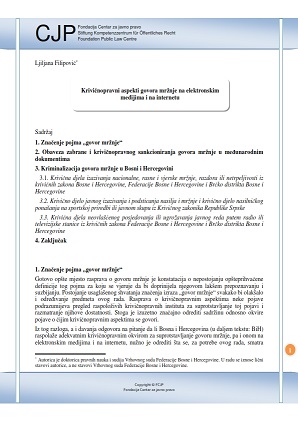
Keywords: Hate speech; criminal law; internet; electronic media; human rights; right to free expression;
The paper considers some criminal law aspects of “hate speech” on electronic media and internet. After the definition of meaning of the term “hate speech” provided for the needs of the paper, and a review of obligations of the member States concerning prohibition and criminalization of hate speech in certain international legal documents, the paper also gives a review of the manner and scope of criminalization of hate speech in the criminal codes in force in BiH. In addition to an analysis of the principal legal elements of the related criminal offenses, the paper pays a special attention to the preconditions which must be satisfied in order that a conviction for the criminal offense of hate speech is not in violation of the right to free expression as one of the fundamental human rights. The paper also refers to the responsibility of journalists and media for hate speech and its spreading, as well as the responsibility of mediators – service providers for hate speech of others.
More...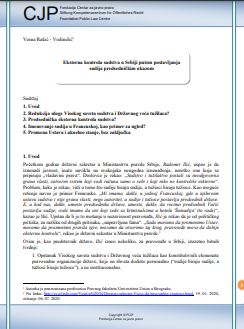
Keywords: Serbia; judiciary; external control; appointment of judges; presidential decree;
Der Anlass für die Analyse ist die Erklärung des Staatssekretärs im Justizministerium über die Ernennung von Richtern in der Republik Serbien. Danach benötige die serbische Justiz eine externe Kontrolle. Diese sei, so die Vorstellung, von dem Präsidenten der Republik durchzuführen. Die Grundlage stelle die Befugnis zur Ernennung von Richtern dar. Einschlägig sei dabei das französische Modell der Richterernennung. In der Analyse werden die für die Justizunabhängigkeit geltenden internationalen Standards, sowie die Verfassungslösungen in Serbien geklärt. Dargestellt sind auch Entwürfe von Verfassungsänderungen aus dem Jahr 2018. Angeführt sind Beispiele der politischen Einflussnahme des derzeitigen Präsidenten der Republik Serbien auf die serbische Justiz, sowie Beispiele für das Erliegen dieser Einflussnahme. Daraus folgt, dass die gegenwärtige Situation keinesfalls zu Gunsten der Verfassungsreform spricht. Die Verfassungsreform würde dazu führen, dass der Präsident selbst oder gar auf Vorschlag des Hohen Justizrates Richter ernennt. Diese Lösung ist weder mit dem geltenden Verfassungssystem noch mit der serbischen Verfassungstradition kompatibel. Aufgrund des aktuellen Demokratiedefizits wird keine Verfassungsreform, die gleichzeitig das Modell der Richterernennung ändert, befürwortet. Andernfalls wird dies zur Einführung eines exekutiv gesteuerten Staates mit rein formellen Elementen der Gewaltenteilung.
More...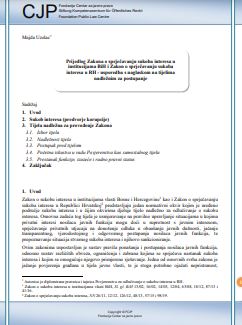
Keywords: law proposal; prevention of conflict of interest; BIH; institutions; Croatia; comparison;
The proposal to establish the Commission as an independent body represents a positive shift and an understanding of society on the need to find an adequate body in whose jurisdiction is an essential element in preventing corruption. Although conflict of interest is only one element in the prevention of corruption, it encompasses different forms of situations and actions of public officials with the highest corruption risk, which are not covered by criminal law, and therefore requires serious approach to these circumstances. The requirement extends to the need for a separate independent body, the competence of which would entail considering such circumstances and pointing to them. The results of each body acting within the scope of whose competence are different measures and ways of combating corruption, their synergistic effect, and the results of the Commission or the Commission for Conflict of Interest may be diminished, if there is no clearly expressed political will and public condemnation of every manifest form of corruption, but also public condemnation of every identified conflict of interest that precedes it. In conclusion, in order to achieve social condemnation and zero tolerance for all forms of corruption, including situations of unresolved conflicts of interest, it is necessary to develop awareness among public office holders and all those parts of the state and social system that should control them, about what a conflict of interest is, how to identify it, and how to properly manage it. Raising such a level of awareness and promoting good and desirable conduct in the exercise of public office is a primary responsibility and obligation of both the Commission envisaged by the Bill on Prevention of Conflict of Interests in the government institutions of Bosnia and Herzegovina and the Commission for Conflict of Interest in the Republic of Croatia.
More...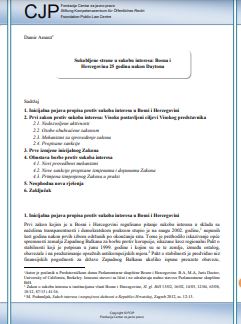
Keywords: BiH; Dayton; 25 years after; conflict of interest;
Bosnia and Herzegovina was among the first countries in the Western Balkans region to have a law on the conflict of interest. This was not, however, due to an effort of domestic political forces, but the Law was instead imposed in 2002 by the High Representative, an international overseer with wide powers under the Dayton Peace Accords. The Law contained definitions and enforcement mechanisms modelled after the best practices in democratic societies, and included a wide array of public officials and their immediate relatives. The proscribed sanctions, however, were unduly severe, requiring in most cases that offending officials be barred from public office for a period of four years. The Law, nonetheless was successful in curbing conflict of interest in the country, and was significantly improved with several subsequent amendments. In 2013, however, the Law was substantially weakened, with enforcement powers transferred from the independent Central Election Commission to a Committee largely composed of elected officials. These changes resulted in a conflict of interest process completely controlled by political parties, subject to frequent and lasting blockades, and completely dormant in periods between elections. Indeed, the new body delivered only ten sanctions in the six years of its existence. This has created a need – voiced by Western governments, various NGO's, and several likeminded elected officials – for a completely new law on the conflict of interest. Such a Draft Law was introduced in the Bosnia and Herzegovina Parliamentary Assembly toward the end of 2017. Due to various procedural delay and blockade mechanisms invoked by the ruling parties, the Draft Law is yet to be considered by the BiH Parliament. Until this or a similar law is adopted, creating a truly independent enforcement body, Bosnia and Herzegovina is unlikely to make meaningful strides on the road to the European Union membership.
More...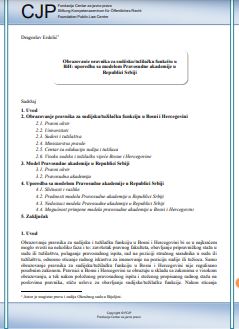
Keywords: BiH; Serbia; prosecutors; judges; education; comparison;
Obrazovanje pravnika za sudijsku i tužilačku funkciju u Bosni i Hercegovini bi se u najkraćem moglo svesti na nekoliko faza i to: završetak pravnog fakulteta, obavljanje pripravničkog staža u sudu ili tužilaštvu, polaganje pravosudnog ispita, rad na poziciji stručnog saradnika u sudu ili tužilaštvu, odnosno sticanje radnog iskustva za imenovanje na poziciju sudije ili tužioca. Samo obrazovanje pravnika za sudijsku/tužilačku funkciju u Bosni i Hercegovini nije regulisano posebnim zakonom. Pravnici u Bosni i Hercegovini se obrazuju u skladu sa zakonima o visokom obrazovanju, a tek nakon položenog pravosudnog ispita i stečenog propisanog radnog staža na poslovima pravnika, stiču uslove za obavljanje sudijske/tužilačke funkcije. Nakon sticanja propisanih uslova, da bi pravnik u Bosni i Hercegovini postao sudija/tužilac potrebno je da konkuriše na javni oglas i u konkursnoj proceduri bude izabran/imenovan za sudiju/tužioca.
More...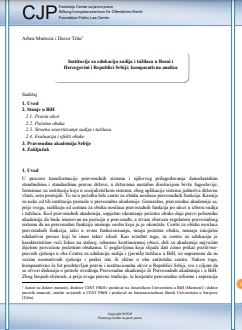
Keywords: BiH; Serbia; judges; prosecutors; education;
The aim of this analysis is to provide an overview of specific segments of education of judicial officials in BiH and to compare them with Serbia, which has a Judicial Academy, in order to raise, in the scientific and professional public, the question of the possible need for the existence of a judicial academy in BiH, i.e. the transformation of Judicial and Prosecutorial Training Centers in BiH into judicial academies or one Judicial Academy.
More...
Keywords: BiH; public law; practical politics; Constitution; anti-state affect;
Centralna tema prava je reguliranje budućnosti: ko piše zakone, pravne dokumente ili ugovore, on regulira budućnost ili bar polazi od pretpostavke da se budućnost može i mora pravno regulirati. Drugim riječima, sadašnjost normativno programira budućnost i u toj prognostičkoj funkciji se očekuje podrška znanosti. Znanost je općenito pozvana da tačno iščita i da shvati znakove vremena kako bi „pripremila budućnost“ za regulativne okvire prava, a pravna znanost je najdirektnije pozvana da u pravu reflektira osnovne pravce budućnosti.
More...
Keywords: BiH; court; Constitutional Court; judge selection; procedure; failure;
Prije godinu dana, Mato Tadić, tadašnji predsjednik Ustavnog suda BiH, obavijestio je predsjedavajućeg Predstavničkog doma Parlamenta Federacije BiH, gospodina Mirsada Zaimovića, da će 15. augusta 2022. godine napuniti 70 godina života, te da će mu po slovu Ustava BiH prestati mandat sudije Ustavnog suda BiH. Tako je Predstavnički dom Parlamenta FBiH imao šest mjeseci da izabere novog sudiju, prije nego što se sudija Mato Tadić penzioniše. Međutim, to se nije desilo ni godinu dana kasnije.
More...